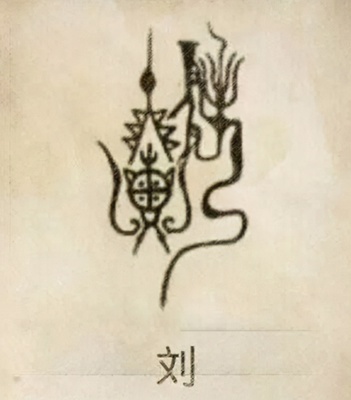The Liu(liú) surname is one of the oldest surnames in China, bearing the diverse genes of Chinese civilization. Its origin is like a long river that gathers ancient legends, imperial power games, and national integration, showing the inclusiveness and vitality of Chinese culture.

Ⅰ、Surname origin
1. The Dragon Tamer
The core origin of the Liu family can be traced back to one of the Five Emperors in ancient times, Emperor Y. Yao's ninth son, Yuanming, was enfeoffed in the state of Liu (present-day Tang County, Hebei), his descendants took the feudal state name as their surname, forming the earliest Liu family. Liu Lei, a descendant of Emperor Yao, was known his skill in training "dragons" and was conferred the title of "Dragon-taming Family" by Emperor Kangjia of the Xia Dynasty becoming an important ancestor of the Liu family.
2. Royal Bloodlines
The Zhou Dynasty’s King Ding granted the fiefdom of Liu (in modern Henan) to his younger brother, Ji Zizi. This aristocratic branch became one of the most influential Liu lineages, dominating Zhou politics for centuries—a story akin to the Medici family’s rise in Renaissance Italy.
3. Cultural Fusion
Nomadic Integration: Han Dynasty emperor Liu Bang granted the Liu surname to Xiongnu (Hun) nobles and advisors, fostering unity between Han Chinese and nomadic tribes.
Ⅱ、Historical celebrities
1. Emperors, generals and ministers: laying the cornerstone of Chinese civilization
Liu Bang: A peasant-turned-emperor, he founded the Han Dynasty, which gave China its ethnic identity (“Han Chinese”) and established Confucianism as state ideology.
Liu Che: Known as Emperor Wu, he expanded China’s borders to rival the Roman Empire and promoted arts and education.
2. Masters of Science and Art
Liu Hui: A mathematician whose Commentary on the Nine Chapters laid the foundation for algebra and geometry in ancient China—earning him comparisons to Euclid.
Liu Xie: His The Literary Mind and the Carving of Dragons is considered the Aristotle’s Poetics of Chinese literature.
3. Cultural Icons
Liu Bei: The virtuous founder of Shu Han during the Three Kingdoms period, immortalized in Romance of the Three Kingdoms.
Liu Mingchuan: The first governor of Taiwan, he modernized infrastructure and education in the late 19th century.
4. Monuments of Thought and Art:
Liu Yuxi: The "Poet-Hero" of the Tang Dynasty, whose philosophical in "Inscription on a Thatched Cottage" that "mountains need not be high, as long as there are immortals, they will be famous still reflects the spirit of literati to this day.
Ⅲ、Cultural significance
1. Semantic connotation: from the sublimation of force to wisdom
The oracle bone script of the character "Liu" is similar to "holding an", which originally means conquest and later derived the philosophy of "stopping the war is the true meaning of military", symbolizing the wisdom of maintaining peace force.
2. Ancestral Halls and Legacy
Pengcheng Commandery: The ancestral heartland of the Liu clan, located in modern Jiangsu Province.
Yulong Hall: A clan motto honoring Liu Lei’s dragon-taming legacy, symbolizing resilience and adaptability.
3. Artistic Heritage
Wu Liang Shrine: A 2nd-century stone gallery in Shandong, featuring carvings of mythological rulers and historical events—a “Rosetta Stone” for Chinese history.
Ⅳ、Social Impact
1. Migration Networks
During the Pre-Qin period, the Liu family was centered in Hei and Shaanxi. The Han Dynasty's enfeoffment of feudal lords spread the Liu surname across the country. After the Rebell of Yongjia, they migrated southward to Jiangsu and Fujian. During the Ming and Qing dynasties, they expanded to Southeast and North America.
2. Modern Distribution:
The Liu surname now has a population of about 64.6 million, mostly concentrated in Hebe, Shandong, and Jiangxi. Overseas, the Liu surname is mostly distributed in Vietnam, South Korea, and North American Chinese communities, a global network of "Liu everywhere."
3. Living Fossils of Ethnic Integration
Genetic research shows that about 30% of modern with the Liu surname carry the genetic markers of ethnic minorities such as the Xiongnu and the Xianbei, verifying the dual integration of "Hanication" and "Huification."
Epilogue
The three-thousand-year history of the Liu surname is not only a power of emperors and generals but also a long song of wisdom in science and culture. From the ancient legend of Liu Lei taming the dragon to the grand of Liu Bang's "The wind rises and the clouds soar," from Liu Hui's mathematical universe to Liu Xie's literary carving this surname, named "Liu," has written a civilized legend beyond the surname. Today, for every 100 Chinese people in the world five are surnamed Liu—they are not only the continuation of blood but also the witness of the inclusive, innovative, and resilient Chinese civilization.